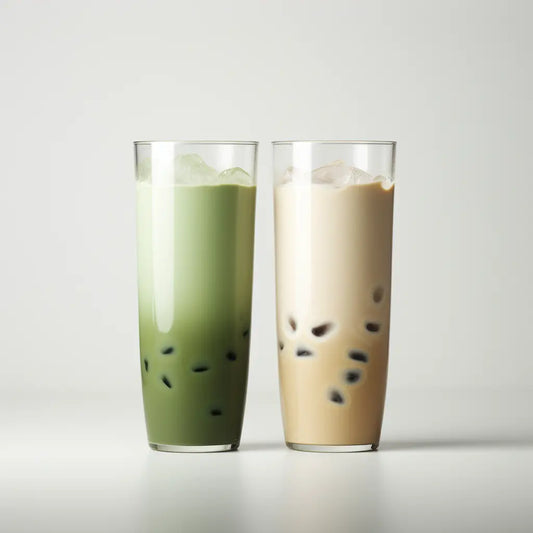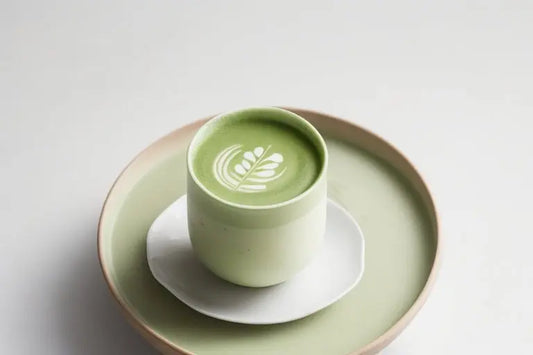Table of Contents
- Introduction
- Green Tea: A Timeless Tradition
- Matcha: A Modern Twist
- Tea Leaves: The Common Denominator
- Processing: Dividing the Two
- Flavor Profiles: Sipping on Differences
- Health Benefits: Pouring Wellness
- Choosing The Right Tea For You
- Tinnies: Where Tradition Meets Innovation
Introduction
Welcome tea lovers and curious readers! In the ever-expanding universe of tea, there's one debate that makes the kettle whistle louder than any other: The difference between Matcha and Green tea. But here's the twist, it's all green tea - Matcha is just a version of it. So, why the divide? Let’s deep dive into the world of Matcha and Green tea, and find out which one might be the right fit for you..
Green Tea: A Timeless Tradition
Ah, green tea! A staple in countless households, it's steeped (pun intended!) in centuries of tradition. Originating from China, green tea is prepared from the leaves of Camellia Sinensis - the tea plant. This brew is famously known for its delightful balance of bitterness and sweetness, and an aroma that teleports you to the freshness of lush, green meadows.
How does green tea get its acclaimed properties? It all boils down to how the leaves are processed. Just like apples turning brown when left in the open, tea leaves oxidize too. We could say, green tea owes its charm to its 'stay-fresh' wielding armor against oxidation.
Matcha: A Modern Twist
Matcha, on the other hand, is not a twist of fate but of tradition. Emerging from the Land of the Rising Sun - Japan, Matcha is also made from Camellia Sinensis. Yet, it's unique, and radically different from green tea, thanks to an artful blend of cultivation and processing techniques.
For starters, Matcha leaves are shaded a few weeks before harvest. This sunlight-starvation causes a chlorophyll explosion, leading to an increased production of amino acids. The result? A darker, richer green color, a sweet taste, and a world of wellness concealed in a cup of Matcha!
Tea Leaves: The Common Denominator
Mirror, mirror on the wall, who's the greenest of them all? It's a tie! Both Green tea and Matcha spring from the same mother - the Camellia Sinensis plant. Despite their family tree, they have starkly different personalities. Imagine them as siblings from the same family, sharing the same DNA, yet being worldly apart in their behaviors, tastes, and appeal.
Processing: Dividing the Two
Green tea is predominantly air-dried or pan-fired to prevent oxidation, which empowers it to hold onto its green hue and nutritional properties. The leaves are then steeped in hot water, imposing a silent cheer of antioxidants, nutrients, and flavor into your cup.
Conversely, Matcha undergoes a more nuanced process. Once the leaves are harvested, they're steamed to halt oxidation and then carefully ground into a fine, velvety powder. When you're having Matcha, you're consuming the actual tea leaf, compared to the steeped essence in green tea. A luscious, creamy texture and an enriched flavor await to disport on your palate with Matcha.
Flavor Profiles: Sipping on Differences
Shall we taste? Green tea is like a subtle poem. With a light and steady tone, it offers a gentle bitterness combined with a slightly sweet undertone. It's the quiet reflection by a serene pond, the comforting murmur of dew-kissed morning.
Matcha, however? It's an opera, loud and vibrant, presenting a pleasing palate of sweet, umami notes followed by a slight hint of bitterness. It's the joyous burst of color at a Spring festival, the exhilaration of a star-studded Summer night.
Health Benefits: Pouring Wellness
Is one more healthful than the other? Not necessarily. Both matcha and green tea are packed with antioxidants, notably ECGC, which contributes to stimulating metabolism and slowing down the growth of harmful cells. However, since Matcha involves consuming the entire leaf, with all its nutrient-rich glory, it might be carrying a denser load of health benefits.
Choosing The Right Tea For You
Choosing between Matcha and Green tea boils down to personal preference. If you enjoy a lighter flavor with a quiet personality, Green tea might be your best friend. If a robust, creamy flavor with high energy is your vibe, Matcha alcove awaits.
Tinnies: Where Tradition Meets Innovation
Tinnies, a bold tea company, embarks you on a thrilling voyage to explore these two green darlings further. We masterfully fuse tradition with modernity, offering an exciting, stylish, and inclusive tea-drinking adventure.
Frequently Asked Questions (FAQ)
1. Can I switch from green tea to Matcha or vice versa easily?
Yes! It just hinges on your flavor profile and health preference.
2. Does Matcha have more caffeine than green tea?
Yes, Matcha does contain more caffeine than regular green tea due to its higher concentration of leaves.
3. Which tea is easier to prepare?
Green tea just needs to be steeped making it slightly easier to prepare. Whereas, Matcha requires the proper whisking of the powder to create the perfect frothy texture.
4. Do they both come from the same plant?
Yes, both teas are derived from the Camellia sinensis plant.
5. Which tea offers more health benefits?
Both are packed with antioxidants, but Matcha edges forward as it involves the consumption of the whole leaf, thereby providing a denser dose of nutrients.
6. Can I mix Matcha with other beverages?
Absolutely! Many even enjoy Matcha in lattes, smoothies, and even cocktails.
7. What influences the taste difference between the two?
The taste difference is largely due to the differences in their cultivation and processing methods.
8. Is it okay to drink Matcha or Green tea every day?
Unless you're sensitive to caffeine, incorporating either tea daily aligns with a healthy lifestyle.
9. Are there different grades of Matcha and Green tea?
Yes, the grades depend on the quality, origin, processing, and taste, among other factors.
10. Where can I buy high-quality Matcha or Green tea?
Tinnies offer a curated selection of quality Matcha and Green teas with rich, aromatic flavors that satisfy and exhilarate your palate.
In the end, whether it's Matcha or green tea, make sure to enjoy every sip of your tea journey. Keep brewing with love and stirring with passion!



